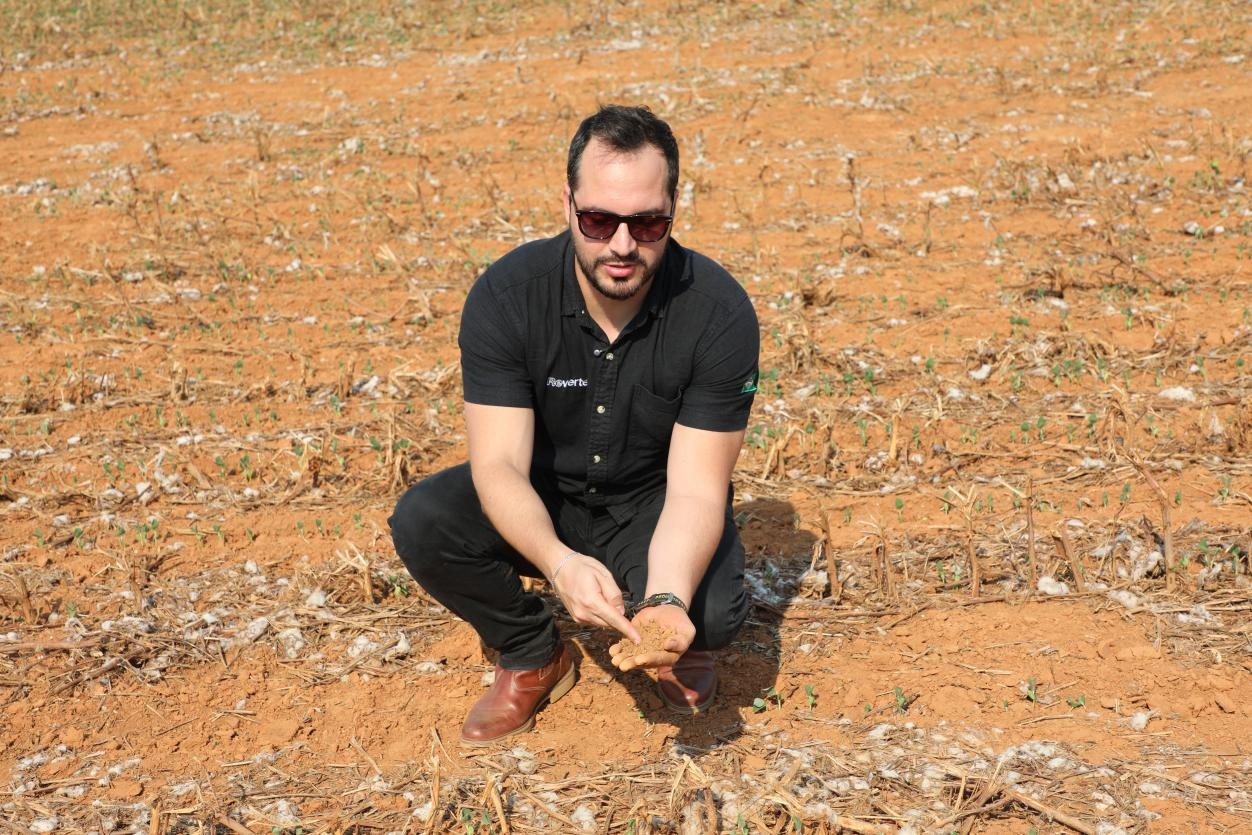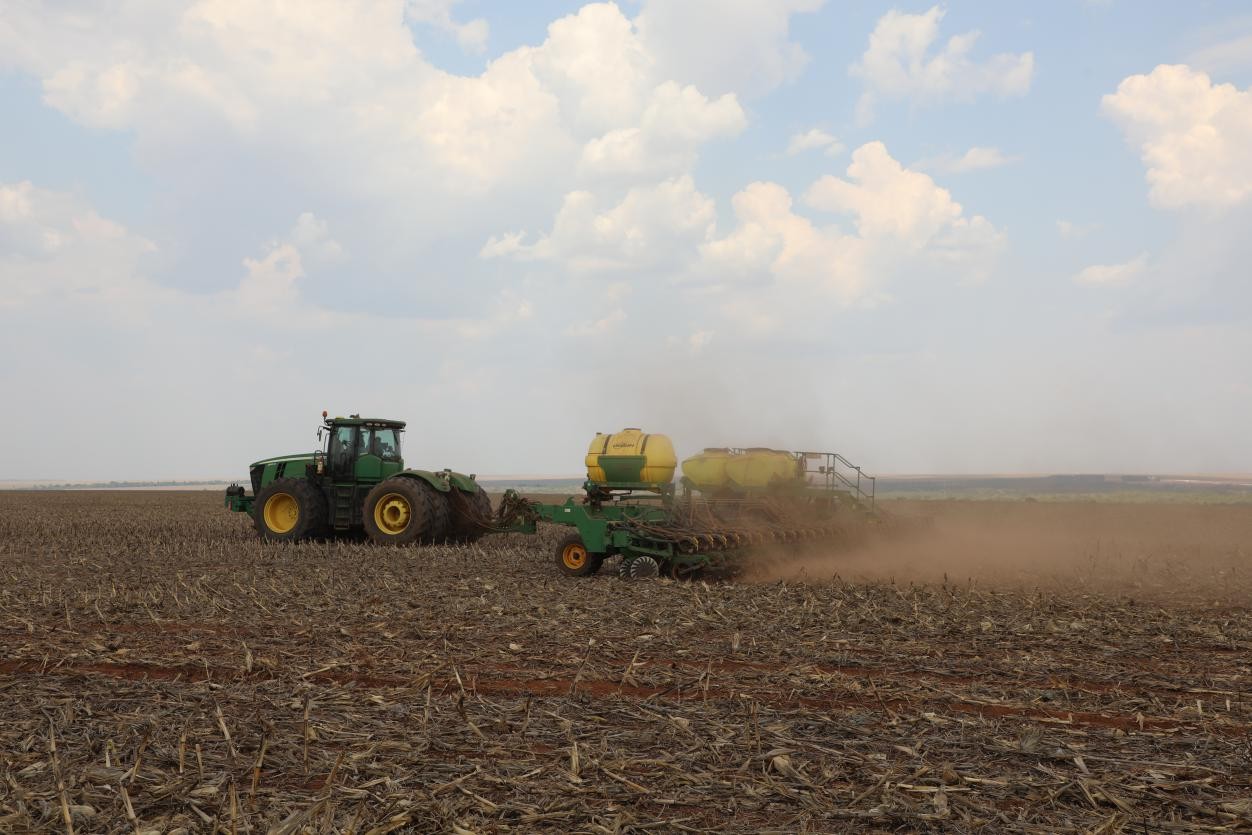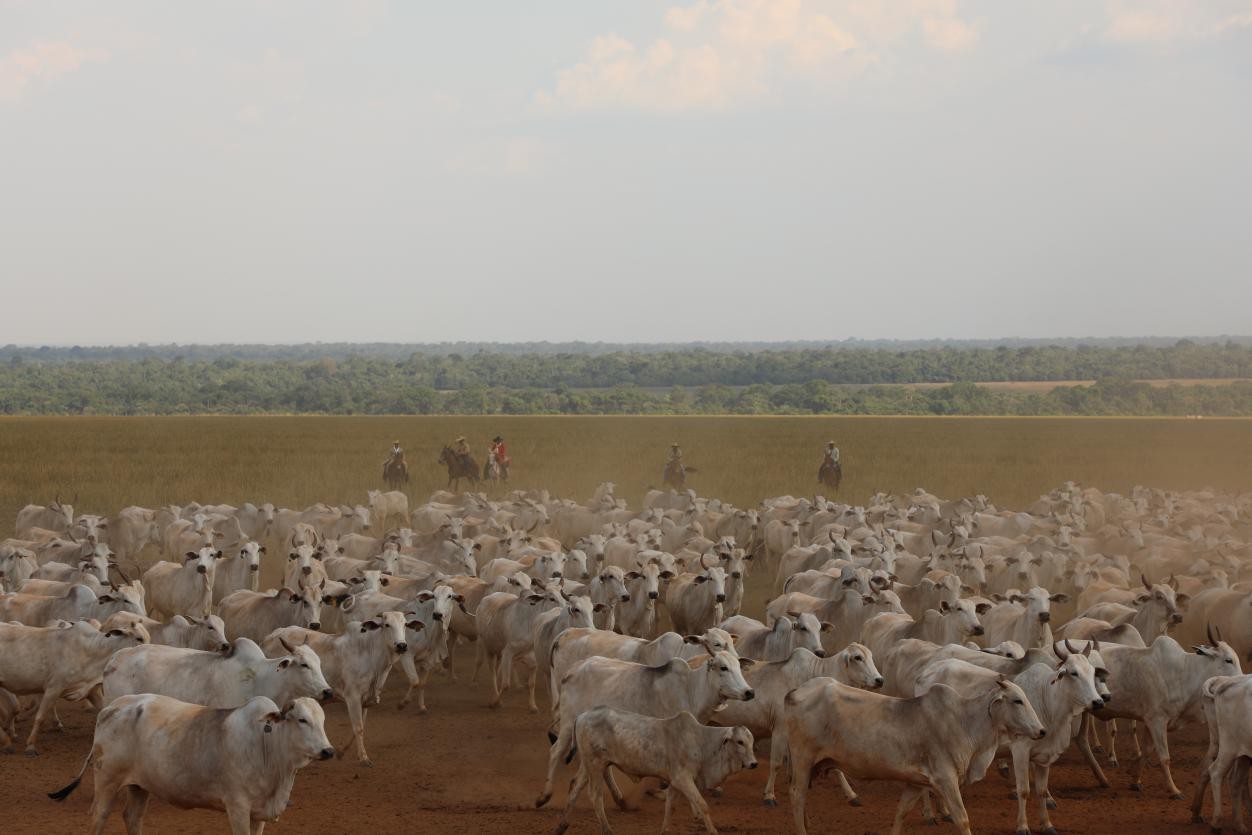Mato Grosso, Brazil (People's Daily) – At noon, under the bright sunlight of Mato Grosso, Brazil's leading agricultural state, Gabriel Mora, sustainability coordinator at Syngenta Group, a subsidiary of Sinochem Holdings, holds two handfuls of soil samples. One is loose and fertile, restored after years of rehabilitation. The other is compacted and lifeless, taken from a degraded pasture. The striking contrast tells the story of a land in transformation.

Syngenta Group sustainability coordinator Gabriel Mora holds soil samples, showing the reporter the loose and fertile "healthy soil" restored through rehabilitation efforts. (Photos: Chen Yiming/People's Daily)
A green revolution supported by Chinese enterprises is quietly unfolding across Brazil's vast farmland. This November, the United Nations Climate Change Conference (COP30) will convene in Belém, Brazil, where sustainable agriculture and land restoration will take center stage.
"We are committed to improving productivity on existing farmland through technological innovation rather than expanding into new areas," said Saswato Das, chief communications officer of Syngenta Group. "This approach boosts yields while protecting the environment."
"Restoring land is a systematic process," Mora explained. "We first neutralize soil acidity with lime, then gradually restore fertility through crop rotation and organic fertilizers." As he demonstrated the "water-drop test," water quickly seeped into the restored soil but pooled on the degraded one. "Healthy soil acts like a sponge," Mora said. "It's the foundation of sustainable agriculture."
Through Syngenta's Reverte Land Restoration Program, once-degraded pastures have been transformed into highly productive fields rotating soybeans, corn and cotton. The initiative has boosted productivity, reduced deforestation and delivered tangible economic gains for farmers.

Using smart agricultural machinery, JCN Farm performs precise seeding, fertilization and pest control operations with higher efficiency and lower environmental impact.
Launched in 2019 by Syngenta Group, Itaú BBA Bank and The Nature Conservancy (TNC), the Reverte project aims to rehabilitate degraded pasturelands. Initially focused on the Cerrado biome, it has since expanded across Brazil, with a goal of restoring one million hectares of degraded land by 2030 and turning them into productive farmland.
By providing agronomic expertise and long-term financing, the program helps farmers make restoration both sustainable and profitable, encouraging them to revitalize existing land rather than clear new areas. As of October this year, Syngenta has restored 279,000 hectares across 11 states and three biomes, with total funding exceeding $378 million.
Standing beside a thriving soybean field, Elson Esteves, agricultural director of JCN Farm, shared his impressions. "Most of our products are exported to China. Today, Chinese consumers are increasingly attentive to green and healthy agricultural practices and that demand is reshaping the future of Brazilian agriculture," he said.
In Esteves' view, the growing Chinese market for sustainable agricultural products offers Brazil a key opportunity for transformation. As a bridge of cooperation between China and Brazil, Sinochem's Syngenta Group is translating that demand into technological innovation and industrial upgrading. "Agriculture must move comprehensively toward sustainability," Esteves emphasized. "We must protect this land for future generations."
Inside the farm's control room, data streams flicker across large screens. "This is our Perfect Flight system," explained technician Albertino, pointing to aircraft trajectories displayed. "High-precision GPS ensures crop-spraying planes apply pesticides only to targeted plots."
On another screen, the Protector system updates real-time pest heat maps, enabling targeted pest management. "Based on this data, we only need to treat 25 hectares affected by pests, sparing the remaining 270 hectares from unnecessary pesticide use," Albertino said. "This precision management not only cuts costs but also minimizes environmental impact."

JCN Farm has introduced an innovative "crop-livestock integration" model, grazing cattle on fields during fallow periods so that manure naturally returns to the soil, reducing fertilizer use by more than 60 percent in corresponding areas.
The farm's "crop-livestock integration" model is equally innovative. "We graze ten head of cattle per hectare for about 90 days, producing the equivalent of 80 to 100 kilograms of nitrogen fertilizer per hectare," the farm manager said. During the fallow season, cattle graze on fields and their manure naturally nourishes the soil. "This allows us to cut fertilizer use by more than 60 percent, a true win-win for ecology and the economy."
In the nursery area, administrator Ronielson carefully tends thousands of native saplings. "These trees will be used to restore vegetation along 46 local streams," he said. The nursery cultivates 35,000 seedlings annually, helping protect water sources and establish ecological corridors.
Meanwhile, at Syngenta's SEEDCARE laboratory, technicians are giving seeds a "smart shield," a special coating that enhances disease resistance and boosts growth efficiency.
Bathed in the setting sun, the fields stretch vibrantly into the distance. "What we are restoring here is not only the land," Esteves said, "but also a way for humans and nature to coexist in harmony."
From Brazilian farmlands to Chinese dining tables, a greener, more sustainable agricultural supply chain is steadily taking shape, a testament to the shared pursuit of sustainable development by the world's two major agricultural nations.


